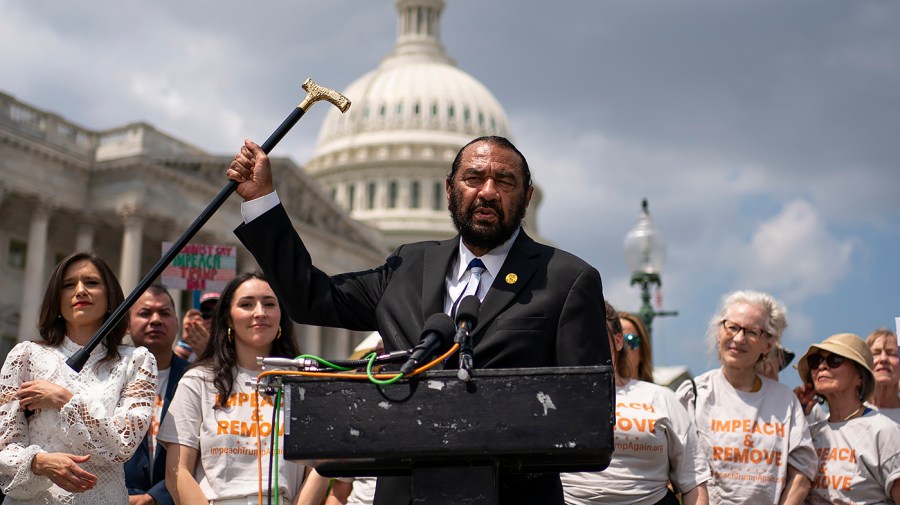Democrats accuse GOP of racism in proposed Texas map

House Democrats are hammering President Trump and GOP leaders for their effort to redraw the congressional map in Texas, accusing the Republicans of “rigging” the system to keep a grip on power — and purposefully disenfranchising millions of minority voters in the process.
“The truth of the matter is: Somebody has to have the courage to say that it’s racism,” Rep. Al Green (D-Texas), a member of the Congressional Black Caucus, told reporters Thursday morning in Austin. “Unfortunately, we have grown to the point in this country where you can use racism against people of color, but people of color can’t respond and say, ‘That’s racism.’”
The outcry comes in response to a proposed congressional map unveiled Wednesday by Texas Republicans at Trump’s urging. The new lines, if approved, are designed to flip at least five Democratic seats to the GOP, making it much harder for Democrats to seize control of the lower chamber in next year’s midterm elections.
The Trump administration, in pushing Texas GOP leaders to redraw the lines, argued the change is needed because the current map gives favor to Black and Latino voters in ways that are illegal. In a letter to Gov. Greg Abbott and Texas Attorney General Ken Paxton, Harmeet Dhillon, assistant attorney general of the Justice Department’s Civil Rights Division, urged state Republicans “to rectify these race-based considerations.”
The Democratic critics dismissed that argument as projection, saying the current lines — drawn by Texas state Republicans just four years ago — already give disproportionate voice to white voters and the newly proposed districts would only exacerbate that lopsided power dynamic.
“Black and brown communities will suffer the most. They’re getting torn up across the state,” Rep. Joaquin Castro (D-Texas) said. “In the last few decades, the overwhelming majority of growth in the state of Texas has come from Latino and African American communities. And yet the number of seats that have been drawn to serve those communities has stayed flat or shrunk.
“And so there is racism to this.”
The proposed Texas map targets Democrats in the state’s largest cities — Houston, Dallas and Austin — as well as those on the U.S.-Mexico border. Two of those border-district Democrats — Reps. Henry Cuellar and Vicente Gonzalez — represent regions won by Trump last year.
The Democratic critics of the plan are quick to note that Republicans already control 25 of Texas’s 38 seats in the U.S. House — an advantage aided by the lines drawn by Republicans in 2021. They say GOP leaders have to “cheat” to stay in power because the Republicans’ policy agenda — including the sharp Medicaid cuts Trump signed into law earlier this month — are unpopular with voters.
“Politicians who don’t want to face the consequences of their votes and their choices can’t just change the rules of the game in the middle of it,” Rep. Lizzie Fletcher (D-Texas) said.
“Texas already has the most racially gerrymandered congressional map in the country, and it’s important to know that of Texas’s 38 congressional districts — in a state with a majority-minority population, where the population of the state is more than 60 percent minority — only 13 districts allow voters of color to regularly and consistently elect their candidate of choice. And this new map cuts that number down to just eight.”
In years past, the Democratic critics could have leaned on the minority protections provided by the Voting Rights Act of 1965 (VRA), which had required certain states to get federal approval before changing election rules. The law had applied on a blanket basis to nine states, including Texas, with documented histories of racial discrimination.
That landmark law was weakened in 2013, when conservatives on the Supreme Court struck down the decades-old formula dictating which regions are subject to the additional layer of scrutiny. Twelve years later, Republicans are seeking new ways to eliminate the remaining VRA protections.
Despite the challenges, House Minority Leader Hakeem Jeffries (D-N.Y.) said he’s hopeful the courts will strike down Texas’s proposed map on the grounds that it discriminates against minority voters.
“The current map violates the law,” he said in Austin on Thursday, “and this congressional map will double and triple down on the extreme racial gerrymandering that is silencing the voices of millions of Texans.”